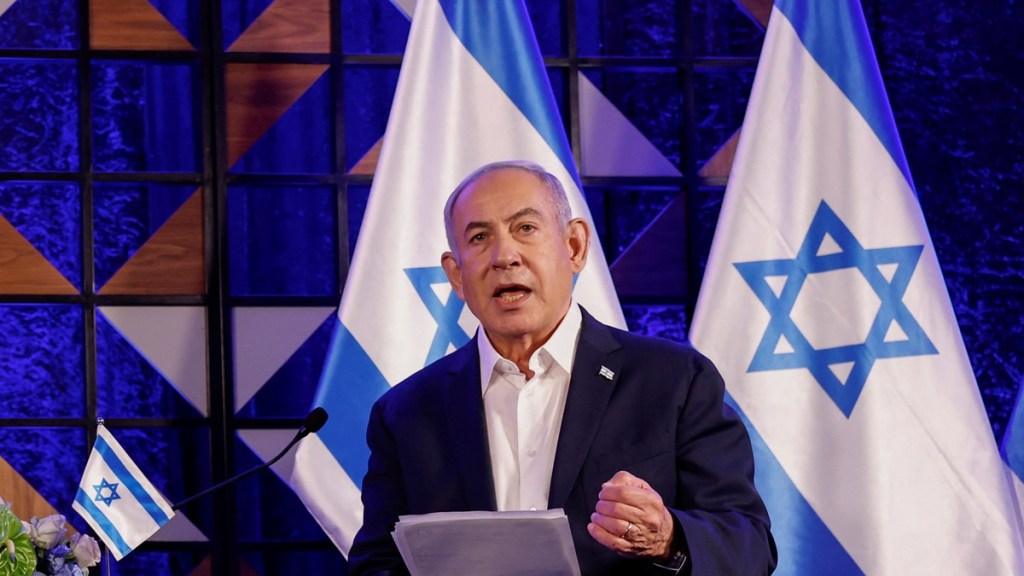By Prof P R Kumaraswamy
Two weeks after the massacre and kidnapping of civilians, there are no signs of a ceasefire in the Israel and Hamas conflict. Though the number has dropped, Hamas rockets continue to target various towns in central Israel. Given the mood on both sides, no external power has the desire, let alone influence, to bring about a ceasefire. Popular anger against the government is palpable in Israel. The beleaguered Prime Minister Benjamin Netanyahu is vulnerable. Calls for accountability are growing. While senior security officials have publicly accepted their ‘responsibility’ for the massive intelligence failure, similar remorse is absent from Netanyahu, at least for now.
The real drama in Israel will begin once sirens along the Gaza border go silent. One thing is certain. Irrespective of their ideological orientations and social backgrounds, people will not forgive Netanyahu for bringing about the most catastrophic movement in Israel’s history. Parallels have been drawn with the 9/11 terrorist attacks and as the source of unparalleled misery since the Holocaust.
Thus, dramatic domestic changes are just a question of time. Netanyahu is no ordinary politician. For over a decade, his tenure has been marked by constant criticisms. He had several opportunities for an honourable exit, especially when facing bribery allegations. He is unlikely to bow out gracefully and will have to be forced out. The night of long knives is not far off. As rockets continue to rain from the Gaza Strip, public opinion is increasingly getting restless, hostile and nosier inside Israel.
While the sequence is difficult to predict, it is safe to conclude that Israel is heading for fresh Knesset elections. Normally, the incumbent Prime Minister heads the caretaker government until the formation of a new government after the election. It will be difficult this time. If the war cabinet is temporary, a unity government under him is even more difficult. Netanyahu—who speaks English like an American and Hebrew like a sabra—will not be able to look his electorates in their eyes and ask for their trust and support. For its own long-term survival, Likud will have to look for an alternative leader.
Unlike in India, the incumbent Knesset, not the government, decides the dissolution of the parliament and fixes the election date. Thus, an interim government headed by someone other than Netanyahu would probably become the caretaker government and enable the finalization of the election date; dissolution could happen before Christmas, with elections in early 2024.
Netanyahu might choose to be the first or last person to leave office, but he will take a horde of senior leaders and officials with him. Leading the list will be Defence Minister Yoav Gallant. Before swapping uniforms for politics, his last position was the commander of Southern Command, which is responsible for “crossings with the Gaza Strip are also under the Southern Command’s authority.” The current commander, Yaron Finkelman, who took over only in early July, will also have to go.
The chief of IDF, Lt. Gen. Harzi Halevi, who already admitted ‘full responsibility’ for not protecting the areas adjacent to the Gaza Strip, will not be able to stay. The same fate awaits Major General Aharon Haliva, the head of the Military Intelligence (Aman). While much of the international attention and glamor revolves around the external intelligence agency—Mossad—it is Aman which is responsible for the strategic assessment of the neighbourhood and plays a critical role in the development of Israel’s military responses to emerging threats. The massive level of surprise Hamas attacks signals intelligence failures at vertical and horizontal failures, and Israel will have to look for a new Aman chief.
Once the sirens stop functioning, Israelis will see an inquiry commission to investigate the massive levels of attacks, casualties and intelligence failures. This is unfamiliar to Indians. The highest Israeli commission of inquiry will be headed by the serving President of the Supreme Court, a position which is currently vacant following the retirement of Esther Hayut on 16 October, right in the midst of the Israel-Hamas conflict. The judicial selection committee will nominate her replacement, and going by the past, Yitzhak Amit—the senior most judge of the court—would become the next president of the Supreme Court.
In the past, Israel had two such commissions of inquiry; the first inquired into the failings of the October War of 1973 and was headed by Shimon Agranat; and the second, under Yitzhak Kahan, was named to inquire into the Sabra and Shatila massacre of Palestinians during Israel’s invasion of Lebanon in 1982. Israel will have the third commission now. The most critical aspect of such a committee is its ability to call anyone, including the serving Prime Minister, to testify. These inquiry commissions are not post-retirement occupations, and their reports are detailed, diligent, timebound and above all, not coloured by political correctness. Hence, they have creditability not only within Israel but also among all those who demand accountability and good governance.
These impending domestic turmoils leading to fresh elections make Israel a functioning and accountable democracy and a source of grudging admiration even for its bitter critics.
The author teaches contemporary Middle East in Jawaharlal Nehru University.
Disclaimer: Views expressed are personal and do not reflect the official position or policy of Financial Express Online. Reproducing this content without permission is prohibited.
